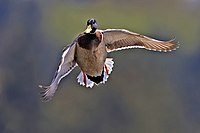Virologists discover why H5N1 doesn't spread easily between humans
Friday, March 24, 2006
Virologists think that the reason the H5N1 strain of bird flu has poor ability to spread between humans is that the infection does not cause coughing or sneezing.
US and Japanese scientists, led by Professor Yoshihiro Kawaoka at the University of Wisconsin at Madison, found that avian influenza and human influenza viruses infect different tissues in the respiratory tract. Another group of scientists, based at the University of Rotterdam, has also published similar results.
Professor Kawaoka's team discovered that bird flu tends to be found among alveoli deep in the lungs. Human flu is instead most prevalent in the mucous lining of the nose and sinuses, as well as the throat, windpipe and bronchi.
Human flu infects parts of the respiratory system that cause coughing and sneezing. When an infected person coughs or sneezes, tiny droplets containing the virus are released into the air, which other humans can inhale, becoming infected. As bird flu infects the alveoli, it doesn't cause coughing or sneezing, and heavy exposure to the virus is required before it can get to the lungs.
Professor Kawaoka said, "For the viruses to be transmitted efficiently, they have to multiply in the upper portion of the respiratory system so that they can be transmitted by coughing and sneezing."
For H5N1 to be transmitted easily among humans, it would need to undergo multiple mutations, according to Professor Kawaoka.
"Certainly, multiple mutations need to be accumulated for the H5N1 to become a pandemic strain," he said.
These mutations would have to affect where the virus binds in the human body and affect the way in which it reproduces.
Currently only one strain of H5N1, A/Hong Kong/213/03, has shown the ability to latch onto cells in both the upper and lower parts of the human respiratory system.
Sources
edit- Richard Ingham. "Why bird flu doesn't spread between humans" — Australian Broadcasting Corporation, March 23, 2006
- Malcolm Ritter. "Experts offer bird flu hope to humans" — The Standard, March 24, 2006
- "Humans a hostile host to bird flu" — The Sydney Morning Herald, March 24, 2006
- "Studies Spot Obstacle to Human Transmission of Bird Flu" — Forbes.com, March 22, 2006
- David Biello. "Bird Flu Resides Deep in Lungs, Preventing Human-to-Human Transmission" — Scientific American, March 23, 2006
| This page has been automatically archived by a robot, and is no longer publicly editable.
Got a correction? Add the template {{editprotected}} to the talk page along with your corrections, and it will be brought to the attention of the administrators. Please note that the listed sources may no longer be available online. |
